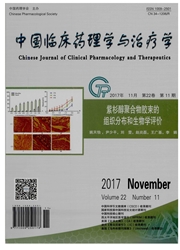

 中文摘要:
中文摘要:
目的:考察新型胆碱酯酶抑制剂Meserine对胆碱酯酶活性及东莨菪碱(Scopolamine)诱导的胆碱能障碍痴呆模型小鼠学习记忆的影响。方法:选取小鼠脑匀浆、血浆、人源重组AChE(rHuAChE)为体外酶源,测定Meserine抑制AChE/BuChE的活性、选择性及酶动力学。通过鼻腔给药后检测脑部AChE活性和ACh浓度评价Meserine对小鼠脑内胆碱能系统的调节。选用避暗及水迷宫实验考察Meserine对痴呆模型小鼠学习记忆功能的影响。结果:Meserine对AChE和BuChE都具有较好的抑制活性,IC50分别为(65.2±3.2)nmol/L和(86.7±4.9)nmol/L,并对rHuAChE呈现非竞争性抑制。经鼻给药Meserine可显著抑制脑内AChE活性、升高ACh水平,且二者变化的时程具有一致性,给药15min后,AChE抑制活性最强(26.9%),ACh浓度最高(1269.0ng/g)。行为学实验结果显示,经鼻给药Meserine(10μg/kg)能显著改善东莨菪碱诱导的痴呆模型小鼠的工作记忆及空间学习能力,较模型组具有统计学差异(P〈0.OlVS东莨菪碱组)。结论:上述结果提示Meserine为强效非竞争性胆碱酯酶抑制剂,经鼻给药Meserine可通过调节脑内胆碱能系统有效改善东莨菪碱诱导的痴呆模型小鼠的学习记忆功能。
 英文摘要:
英文摘要:
AIM: The present study was de signed to assess the effects of a novel cholines terase inhibitor Meserine on cholinesterase activ ity and cognitive impairment induced by scopol amine in mice. METHODS: Mouse brain homogenate, mouse plasma and recombinant human AChE (rHuAChE) were used to assess the cho- linesterase inhibitory activity, selectivity and en- zyme kinetics of activity and ACh Meserine in vitro. The AChE level in mice brain were measured to evaluate the in vivo effect of Meserine on brain cholinergic system. Passive avoidance test and Morris water maze test were utilized to veri- fy the efficacy of Meserine on scopolamine-in- duced amnesia in mice. RESULTS.Meserine pos- sessed good inhibitory activity against AChE and BuChE, with ICs0 of (65.2±3.2) nmol/L and (86.7±4.9) nmol/L, respectively. Enzyme ki- netics study showed that Meserine was a non- competitive inhibitor on rHuAChE. After in- tranasal administration of Meserine, the AChE inhibition and ACh level in brain changed consistently. The peak of AChE inhibition (26.9%) and ACh level (1269.0 ng/g) were reached around 15 min after administration. Theresults of behavior tests showed that Meserine (10μg/kg, i. n. ) could significantly reverse the cognitive impairments induced by scopolamine in mice (P〈0. 01 vs Scop) . CONCLUSION: Our results suggested that Meserine was a potent noncompetitive cholinesterase inhibitor. In- tranasal administration of Meserine could effec- tively ameliorate the scopolamine-induced amne- sia in mice via modulating brain cholinergic sys- tem.
 同期刊论文项目
同期刊论文项目
 同项目期刊论文
同项目期刊论文
 期刊信息
期刊信息
